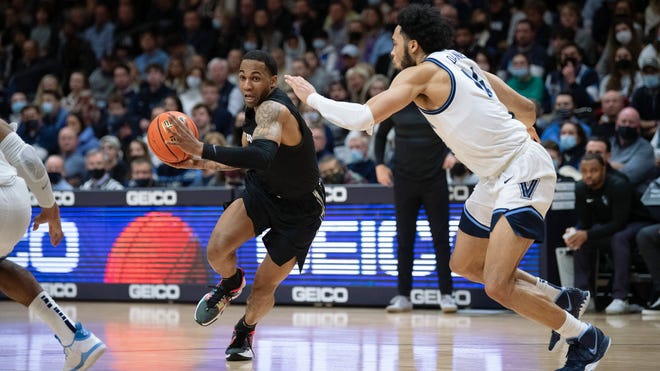Grief from Chadwick Boseman's death endures like a punch to the gut for those who worked with him on Marvel's "Black Panther" and witnessed the void in its new sequel.
Boseman's roles resonated with audiences. He played real-life figures like James Brown in "Get On Up" and Jackie Robinson in "42," and dramatic roles in Netflix dramas "Ma Rainey's Black Bottom" and "Da 5 Bloods." But perhaps none topped superhero King T'Challa, the leader of the fictional African nation of Wakanda in 2018's award-winning Marvel film "Black Panther," which became one of the highest-grossing films of all time in the U.S.
So his death at 43, on Aug. 28, 2020, from a battle with colon cancer, undisclosed even to his castmates, reverberated around the globe and in his inner circle of collaborators.
His "Black Panther" co-stars had to soldier onward for the sequel "Black Panther: Wakanda Forever" (in theaters now), finding themselves thrust into the center of the story without their intrepid leading man.
"I experienced a whole lot of grief and disillusionment," says Lupita Nyong'o, who stars as Wakandan spy and T'Challa's love interest Nakia, "and just wondering 'What is life about?' and 'How do we move forward?' and 'What does it all mean at the end of the day?' and 'What is this make-believe, and why is it worthwhile?'"
'Beautiful love letter':Letitia Wright, Lupita Nyong'o talk creating 'Black Panther: Wakanda Forever'

The film, masterfully directed by Ryan Coogler, reintroduces the women of Wakanda as they confront feelings of retribution and resilience amid their grief, following T'Challa's death from an illness. His onscreen death is abrupt, much like Boseman's, but the celebration of his life and remembrance of his legacy stays the course of the two hour and 41-minute feature, including a photo and video montage near the beginning that also serves as a moment of silence, and a tear-jerking Rihanna ballad that concludes the film.
Letitia Wright, who plays T'Challa's scientist sister Shuri, says processing feelings as a group was about "being real with where we were in those stages of grief, and just communicating with one another."
'Black Panther 2' review:'Wakanda Forever' is a profound, action-packed take on life and legacy

"It was a collective mourning, and we held each other very close and respected what each other would need at different moments," she says.
Each character highlights differing stages of the healing process. The inability to save her older brother devastates Shuri and erects an emotionally impenetrable wall around her, while her mother, Queen Ramonda (Angela Bassett), who stoically takes the throne, encourages her to process the loss and feel T'Challa's spirit. Nakia withdraws and finds comfort in her new home of Haiti, as Dora Milaje Gen. Okoye (Danai Gurira) doubles down on her loyalty to the crown.
But grief manifests in strange ways.
"Some days I found a weird sense of ability to move through it, gliding through it, doing the scenes without feeling affected. And then the next day, you topple over and you're just trying to figure out what happened, and there Danai would be to lift me up and encourage me, and then vice versa," Wright says.
'Black Panther: Wakanda Forever':What to know before you go see the Marvel sequel
'We are here now':Namor's Mayan-inspired kingdom is new foe in 'Black Panther: Wakanda Forever'

How do you move on from loss? The film tries to answer that from a variety of perspectives, and it highlights the war outside and within in part through a new villain, underwater Talokan kingdom leader Namor (Tenoch Huerta Mejía). Namor's own centuries-long journey through mourning connects him to Shuri, as inner rage propels them to want to see the world burn for causing their hurt.
Returning for the sequel was comforting for Nyong'o, who used her character as a teacher to heal.
"It was reassuring that art could imitate life in such a close manner," Nyong'o says. "We meet (Nakia) at a point where she is more advanced in her grief process than I was. But because I was playing her I got to learn from her in ways that are invaluable."

Art also imitated life as fans' view of Boseman mirrored how he wanted them to feel about T'Challa: "There’s a hero here that I hope people grow to love," he said in a 2018 interview with USA TODAY.
Boseman's co-stars remember a man full of life.
"His presence was so anchoring, and it just allowed you to feel supported and seen, and like you had a brother who had your back," Gurira says. "That's always a terrible thing to lose, but he had a lot of joy in him, and you didn't quite know when and how it would come out."
Remembering Chadwick Boseman:His 5 greatest roles, from 'Black Panther' to 'Da 5 Bloods'

Gurira says there were "so many things to miss about him: his warmth, that hand on your shoulder when he was cracking that laugh. He was also someone who just really deeply understood and embraced and invested in the culture of the diaspora. … He brought such integrity to it from the very beginning, accent-wise, language-wise, … that type of integrity and specificity and commitment to his craft was also a part of his indelible leadership."

Boseman's memory became a driving force on set. "Even though there were moments when we were overcome with the fact that we lost him, there were also those moments where we were bolstered by his spirit and the way he showed up," Nyong'o says. "We kept his spirit very much alive in that way."
Who's the new Black Panther?:Here's what we know (so far) about Marvel's 'Wakanda Forever'
From the first film:5 ways that 'Black Panther' celebrates and elevates black women
Source link










